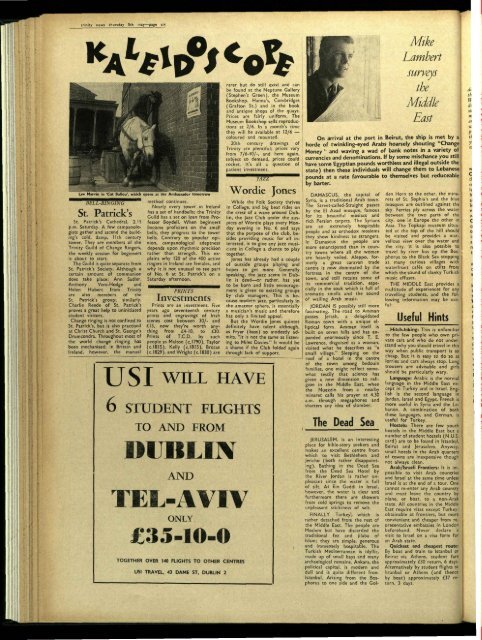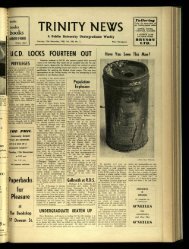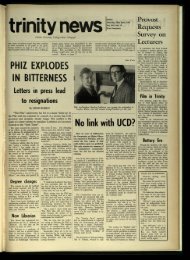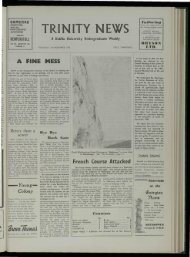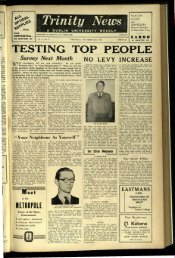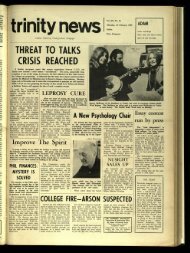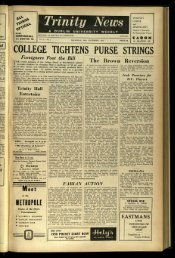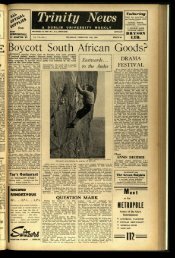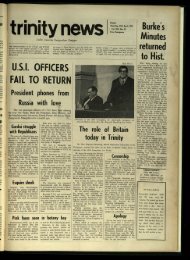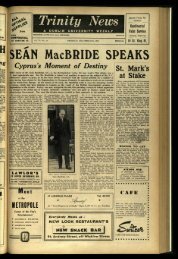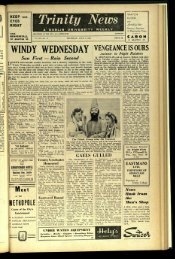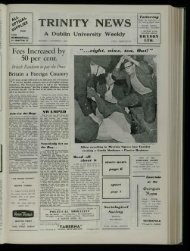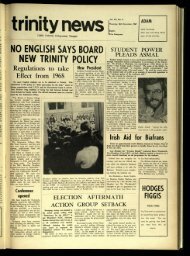Trinity News Archive
Trinity News Archive
Trinity News Archive
- No tags were found...
You also want an ePaper? Increase the reach of your titles
YUMPU automatically turns print PDFs into web optimized ePapers that Google loves.
trinity news thursday 5th rnay--page sixi1¯ , . ’,s -~.., ,, ,¯" .,.Q-. ,;].,.; [,’~’s.. "¯ , .y " i-’..-L -¯ ~..L 7; ¯! .7?l ¯’- i "t, ¢.J.! ’J~’ Lr, :’ ¯ [,, [.., ;,1¯ .,~ ¯j.,;/ ,b~Lee Ma,rvin in ’Cat Ballou’, which opens at the Ambassador tomorrowBELL-RINGINGSt. Patrick’sSt. Patrick’s Cathedral, 2.15p.m. Saturday. A few campanologistsgather and ascend the building’scold, damp, l lth centurytower. They are members of the<strong>Trinity</strong> Guild of Change Ringers,the weekly session for beginnersis about to start.The Guild is quite separate fromSt. Patrick’s Society. Although acertain amount of communiondoes take place: Ann Sadier,Anthony Vere-Hodge andHelen Hubert from <strong>Trinity</strong>are also members of theSt. Patrick’s group; similarly,Charlie Reede of St. Patrick’sproves a great help to uninitiatedstudent visitors.Change ringing is not confined toSt. Patrick’s, but is also practisedat Christ Church and St. George’sDrumcondra. Throughout most ofthe world change ringing hasbeen mechanised; in Britain andIreland, however, the manualmethod continues.Nearly every tower in Irelandhas a set of handbells; the <strong>Trinity</strong>Guild has a set on loan from ProfessorBoydell. When beginnersbecome proficient on the smallbells, they progress to the towerbells. Contrary to popular opinion,campanological adeptnessdepends upon rhythmic precisionrather than strength¯ This explainswhy 120 of the 400 activeringers in Ireland are females, andwhy it is not unusual to see partof No. 6 at St. Patrick’s on aSaturday afternoon.PRINTSInvestmentsPrints are an investment. Fiveyears ago seventeenth centuryprints and engravings of Irishscenes cost between 30/- and£13, now they’re worth anythingfrom £4-10, to £30.Prints of T.C.D. by suchpeople as Nalton (c.1790), Taylor(c.1815), Kelly (c.1815), Brocas(c.1829), and Wright (c.1830) arerarer but do still exist and canbe found at the Neptune Gallery(Stephen’s Green), the MuseumBookshop, Hanna’s, Combridges(Grafton St.) and in the bookand antique shops of the quays.Prices are fairly uniform. TheMuseum Bookshop sells reproductionsat 2/6¯ In a month’s timethey will be available at 12/6coloured and mounted¯20th century drawings of<strong>Trinity</strong> are plentiful; prices varyfrom 7/6-40/-, and here again,subject to demand, prices couldrocket. It’s all a question ofpatient investment¯:TAZZWordie JonesWhile the Folk Society thrivesin College, and big beat rides onthe crest of a wave around Dublin,the Jazz Club under the auspicesof Wordie plays every Nondayevening in No. 6 and saysthat the purpose of the club, besidesproviding music for all interested,is to give any jazz musiciansin College a chance to playtogether.Jones has already had a coupleof outside groups playing andhepes to get more. Generallyspeaking, the jazz scene in Dublinis dead--or rather, has yetto be born and little encouragementis given to existing groupsby club managers. This is becausemodern jazz, particularly inthe amateur sphere, is essentiallya musician’s music and thereforehas only a limited appeal.But the Wordie Jones quintetdefinitely have talent although,as Fryer (bass) so modestly admits,"it is not the same as listeningto Miles Davies." It would bea shame if the Club folded againthrough" lack of support.U S 1 ’rl LL HAVE6 STUDEN’F I LIGHTSTO AND FROMDUBANDONLY£35-10-0TOGETHER OVER 140 FLIGHTS TO OTHER CENTRESUSI TRAVEL, 43 DAME ST, DUBLIN 2Md3/eOn arrival at the port in Beirut, the ship is met by ahorde of twinkling-eyed Arabs hoarsely shouting "ChangeMoney ’" and waving a wad of bank notes in a variety ofcurrencies and denominations. If by some mischance you stillhave some Egyptian pounds worthless and illegal outside thestate) then these individuals will change them to Lebanesepounds at a rate favourable to themselves but reduceable!by barter.DAMASCUS, the capital ofSyria, is a traditional Arab town.The Street-called-Straight passesby the El Azad mosque, famousfor its beautiful mosiacs andrich Persian carpets. The Syriansare an extremely hospitablepeople and as orthodox moslemsthey show kindness to strangers.In Damascus the people aremore emancipated than in countrytowns where all the womenare heavily veiled. Aleppo, formerlya great caravan tradecentre is now dominated by thefortress in the centre of thetown, and still retains some ofits commercial tradition, especiallyin the soul which is full ofaromatic smells and the soundof wailing Arab music.JORDAN IS possibly still morefascinating¯ The road to Ammanpasses Jerash, a delapidatedRoman town with a unique ellipticalform. Amman itself isbuilt on seven hills and has expandedenormously since T. E.Lawrence, disguised as a woman,visited what he describes as "asmall village." Sleeping on theroof of a hotel in the centreof the town among bedouinfamilies, one might reflect somewhattestily that science hasgiven a new dimension to religionin the Middle East, whenthe Muezzin from a nearbyminaret calls his prayer at 4.30a.m. through megaphones andshatters any idea of slumber.The Dead SeaJERUSALEM, is an interestingplace for bible-story seekers andmakes an excellent centre fromwhich to visit Bethlehem andJericho (both rather disappointing).Bathing in the Dead Seafrom the Dead Sea Hotel bythe River Jordan is rather unpleasantsince the water is fullof silt. At Ein Geddi in Israel,however, the water is clear andfurthermore there are showersfrom cold springs to remove theunpleasant stickiness of salt.FINALLY Turkey~,, which israther detached from the rest ofthe Middle East. The people areMoslem but have discarded thetraditional fez and jilaba ofIslam; they are simple, generousand immensely hospitable. TheTurkish Mediterranean is idyllic,made up of small bays and manyarchaelogical remains. Ankara, thepolitical capital, is modern anddull and is quite different fromIstanbul. Arising from the Bosphorusto one side and the GoldenHorn to the other, the mina-irets of St. Sophia’s and the blue lmosques are outlined against the isky. Ferries ply across the water,between the two parts of thecity, one in Europe the other inAsia. The Topkapi museum situa.ted at the top of the hill shouldbe visited and provides a marvellousview over the water andthe city. It is also possible totravel by river bus up the Bosphorusto the Black Sea stoppingat many curious villages withwaterfront cafes on stilts fromwhich the sound of clanky Turkishmusic effuses.THE MIDDLE East provides amultitude of experiences for anytravelling students, and the followinginformation may be useful:Useful Hints...... Hitch-hiking: This is unfamiliarto the few people who own privatecars and who do not understandwhy you should travel in thisway when public transport is socheap. But it is easy to do so aslorries and cars always stop. Longtrousers are advisable and girlsshould be particularly¯ wary.Language: Arabic is the normallanguage in the Middle East exceptin Turkey and in Israel. Englishis the second language inJordan, Israel and Egypt. French ismore useful in Syria and the Lebanon.A combination of boththese languages, and German, isuseful for Turkey.Hostels: There are few youthhostels in the Middle East but anumber of student hostels (N.U.S.card) are to be found in Istanbul,Beirut and Jerusalem. Anyway,small hotels in the Arab quartersof towns are inexpensive thoughnot always clean.Arab/Israeli Frontiers: It is impossibleto visit Arab countriesand Israel at the same time unlessIsrael is at the end of a tour. Onecannot re-enter any Arab countryand must leave the country byplane, or boat, to a non-Arabstate. All countries in the MiddleEast require visas except Turkey;obtainable at frontiers, but moreconvienient and cheaper from representativeembassies in Londonbeforehand¯ Never declare avisit to Israel on a visa form foran Arab state.Quickest and cheapest route:By boat and train to Istanbul orBeirut via Athens, student fareapproximately £30 return, 6 days.Alternatively by student flights toI~:tanbul or Athens (and thenceby boat) approximately £37 re.turn, 3 days.d~thd~glPti~r


